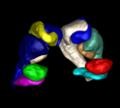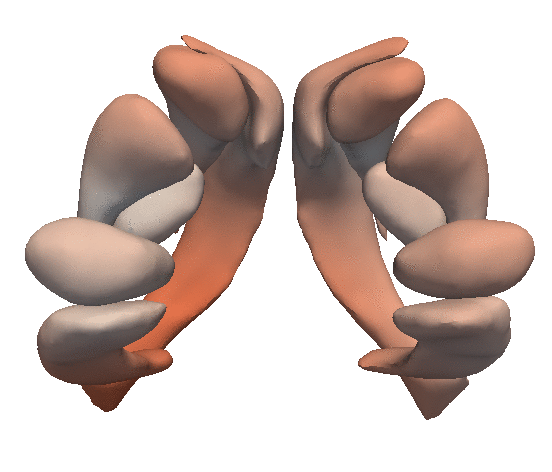Difference between revisions of "2011 Summer Project Week long shape regression"
From NAMIC Wiki
Jfishbaugh (talk | contribs) |
Jfishbaugh (talk | contribs) |
||
| Line 45: | Line 45: | ||
[[Image:Sub_cort_evolution_sigmaV_10_sigmaW_10_gammaR_0p1.gif|center|Evolution of sub-cortical structures.]] | [[Image:Sub_cort_evolution_sigmaV_10_sigmaW_10_gammaR_0p1.gif|center|Evolution of sub-cortical structures.]] | ||
| − | [[Image:Volume_sigmaV_10_sigmaW_10_gammaR_0p1.png|center|Volume measured after shape regression. Plus signs denote target volume.]] | + | [[Image:Volume_sigmaV_10_sigmaW_10_gammaR_0p1.png|thumb|400px|center|Volume measured after shape regression. Plus signs denote target volume.]] |
==References== | ==References== | ||
Fishbaugh, J., Durrleman, S., Gerig, G. "Estimation of Smooth Growth Trajectories With Controlled Acceleration From Time Series Shape Data". MICCAI 2011. To appear. | Fishbaugh, J., Durrleman, S., Gerig, G. "Estimation of Smooth Growth Trajectories With Controlled Acceleration From Time Series Shape Data". MICCAI 2011. To appear. | ||
Revision as of 01:15, 24 June 2011
Home < 2011 Summer Project Week long shape regressionLongitudinal Shape Regression - Huntington's Disease
Key Investigators
- Utah: James Fishbaugh, Marcel Prastawa, Guido Gerig
- Iowa: Hans Johnson
Objective
To begin processing longitudinal Huntington's disease data and to apply our shape regression framework to available data. We are interested in the evolution of sub-cortical structures in the brain.
We would like to estimate continuous growth scenarios for several shapes of interest, which can eventually be combined with a framework for 4D registration or 4D atlas construction, to statistically analyze the growth variability within a population.
Approach, Plan
- Segment sub-cortical structures
- Estimate growth trajectories
Progress



